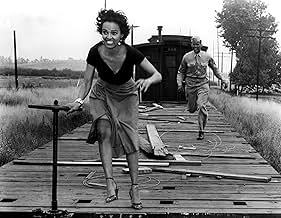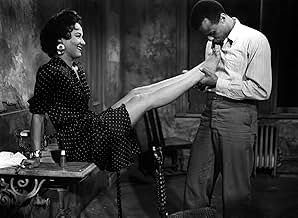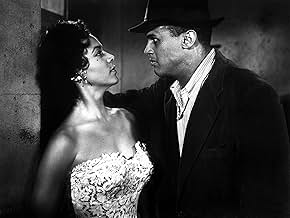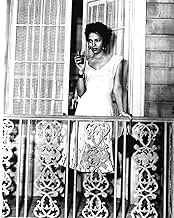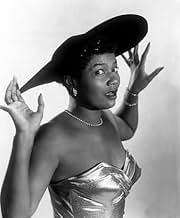VALUTAZIONE IMDb
6,7/10
6260
LA TUA VALUTAZIONE
Aggiungi una trama nella tua linguaContemporary version of the Bizet opera, with new lyrics and an African-American cast.Contemporary version of the Bizet opera, with new lyrics and an African-American cast.Contemporary version of the Bizet opera, with new lyrics and an African-American cast.
- Regia
- Sceneggiatura
- Star
- Candidato a 2 Oscar
- 6 vittorie e 8 candidature totali
Brock Peters
- Sergeant Brown
- (as Broc Peters)
LeVern Hutcherson
- Joe
- (voce)
- (as Le Vern Hutcherson)
Marilyn Horne
- Carmen Jones
- (voce)
- (as Marilynn Horne)
Marvin Hayes
- Husky Miller
- (voce)
Alvin Ailey
- Dance Soloist
- (non citato nei titoli originali)
DeForest Covan
- Trainer
- (non citato nei titoli originali)
Joseph E. Crawford
- Dink Franklin
- (voce (canto))
- (non citato nei titoli originali)
Carmen De Lavallade
- Dance Soloist
- (non citato nei titoli originali)
Bernie Hamilton
- Reporter
- (non citato nei titoli originali)
Margaret Lancaster
- Singing Voice
- (non citato nei titoli originali)
Recensioni in evidenza
It's incredible that it took an Austrian director, Otto Preminger, the courage to bring this wonderful screen adaptation of the Bizet's immortal opera Carmen to the American public. As a musical, "Carmen Jones" had been seen, successfully, on Broadway, because of the many talented black performers that weren't allowed to be seen in Hollywood movies. Preminger had a knack for tackling issues that other, better known directors, stayed away from.
"Carmen Jones", as seen today, shows us a film that is somehow dated, but when it made its debut, it surprised a lot of people because it was a revolutionary work, something the American movie goers weren't used to seeing. The strength of the film lies in the performances Mr. Preminger got from his multi-talented cast.
The adaptation of the opera sets the film in the South. We are taken to a military base during the war. The local people work in the factory, attached to the base, making parachutes and other war related equipment. Carmen Jones, is the sultry young woman who sticks out from the rest of her co-workers, not only by her beauty, which was obvious, but by the way she can reduce men to servitude, which is what happens to Joe, the man who is being promoted until fate intervenes and Carmen renders him useless.
The gorgeous Dorothy Dandridge made a magnificent Carmen Jones. In fact, this was Ms. Dandridge's best screen work because she smolders the screen every time she is seen in the film. Harry Belafonte is Joe, the man whose passion for the lovely Carmen will consume him and will not let him see straight. Pearl Bailey is a delight in her take of Frankie. Olga James is seen as the sweet Cindy Lou, the girl in love with Joe. Joe Adams, Brock Peters and a young Diahann Carroll are also seen in minor roles.
Some comments to the IMDb forum express their displeasure at the way the voices are heard. This seems to have been the only thing that Preminger should have worked with his collaborators Oscar Hammerstein II and Harry Kleiner into having the opera melodies sung naturally, the way one would expect Ms. Dandridge, who could sing, and of course, Harry Belafonte, a wonderful singer, to deliver them in a way that would have pleased those audiences not accustomed to hearing classical opera.
Regardless of what we think today, this was one of the breakthroughs that proved to America they could enjoy black performers on their merits and talent. Otto Preminger must be praised for being a pioneer in this field and for daring to be a man ahead of his time.
"Carmen Jones", as seen today, shows us a film that is somehow dated, but when it made its debut, it surprised a lot of people because it was a revolutionary work, something the American movie goers weren't used to seeing. The strength of the film lies in the performances Mr. Preminger got from his multi-talented cast.
The adaptation of the opera sets the film in the South. We are taken to a military base during the war. The local people work in the factory, attached to the base, making parachutes and other war related equipment. Carmen Jones, is the sultry young woman who sticks out from the rest of her co-workers, not only by her beauty, which was obvious, but by the way she can reduce men to servitude, which is what happens to Joe, the man who is being promoted until fate intervenes and Carmen renders him useless.
The gorgeous Dorothy Dandridge made a magnificent Carmen Jones. In fact, this was Ms. Dandridge's best screen work because she smolders the screen every time she is seen in the film. Harry Belafonte is Joe, the man whose passion for the lovely Carmen will consume him and will not let him see straight. Pearl Bailey is a delight in her take of Frankie. Olga James is seen as the sweet Cindy Lou, the girl in love with Joe. Joe Adams, Brock Peters and a young Diahann Carroll are also seen in minor roles.
Some comments to the IMDb forum express their displeasure at the way the voices are heard. This seems to have been the only thing that Preminger should have worked with his collaborators Oscar Hammerstein II and Harry Kleiner into having the opera melodies sung naturally, the way one would expect Ms. Dandridge, who could sing, and of course, Harry Belafonte, a wonderful singer, to deliver them in a way that would have pleased those audiences not accustomed to hearing classical opera.
Regardless of what we think today, this was one of the breakthroughs that proved to America they could enjoy black performers on their merits and talent. Otto Preminger must be praised for being a pioneer in this field and for daring to be a man ahead of his time.
This memorable melodrama is an interesting adaptation of the classic "Carmen" story and music with a new setting and new song lyrics. Most of it works quite well, but it is remembered most of all for Dorothy Dandridge's impressive performance as "Carmen Jones".
The basic Carmen story itself is a perceptive and tragic look at the elemental passions and emotions that drive so much of what happens in human relationships. For the story to work most effectively, it takes a Carmen who not only has plenty of energy, but who also can be convincing in dominating all of the other characters. Dandridge excels at both, and she makes it easy to believe that she could get practically anything that she wanted from anyone.
Except for Pearl Bailey, who makes her character lively and entertaining in her own right, most of the rest of the cast is solid but is clearly - as is no doubt meant to be the case - overshadowed by Dandridge and Carmen. One exception, though, is Olga James as Cindy Lou. Although her character is very meek, and has no chance against Carmen, James does a fine job of making her sympathetic without becoming overly weepy or maudlin, and her performance adds some additional depth to the drama of relationships.
Most of the musical numbers work well, and there is good variety in them, as there is also in the settings and the material. The climactic sequence in the arena is nicely crafted, with the prizefight taking place in full view while, hidden from sight, the characters' passions are reaching the boiling point. It caps off an effective and interesting movie.
The basic Carmen story itself is a perceptive and tragic look at the elemental passions and emotions that drive so much of what happens in human relationships. For the story to work most effectively, it takes a Carmen who not only has plenty of energy, but who also can be convincing in dominating all of the other characters. Dandridge excels at both, and she makes it easy to believe that she could get practically anything that she wanted from anyone.
Except for Pearl Bailey, who makes her character lively and entertaining in her own right, most of the rest of the cast is solid but is clearly - as is no doubt meant to be the case - overshadowed by Dandridge and Carmen. One exception, though, is Olga James as Cindy Lou. Although her character is very meek, and has no chance against Carmen, James does a fine job of making her sympathetic without becoming overly weepy or maudlin, and her performance adds some additional depth to the drama of relationships.
Most of the musical numbers work well, and there is good variety in them, as there is also in the settings and the material. The climactic sequence in the arena is nicely crafted, with the prizefight taking place in full view while, hidden from sight, the characters' passions are reaching the boiling point. It caps off an effective and interesting movie.
This is the story of a soldier, Joe (Harry Belafonte) and a fiery lady, Carmen (Dorothy Dandridge) and their unlikely relationship which begins with Joe trying to transport Carmen to the brig...and ends up with the pair falling in love.
If you are looking to see a classic opera translated into more modern times and with entirely new lyrics, then "Carmen Jones" is definitely for you. However, regardless of its all-black cast, this is clearly a film that is for very select folks! You hate opera well then the film will be a tough sell! As for me, I would have enjoyed the music OR the story. The total package didn't hold my interest. But this does NOT mean the film is bad or poorly made...it's not. It's all a matter of personal taste.
If you are looking to see a classic opera translated into more modern times and with entirely new lyrics, then "Carmen Jones" is definitely for you. However, regardless of its all-black cast, this is clearly a film that is for very select folks! You hate opera well then the film will be a tough sell! As for me, I would have enjoyed the music OR the story. The total package didn't hold my interest. But this does NOT mean the film is bad or poorly made...it's not. It's all a matter of personal taste.
to see this amazing film. I thought Halle Berry did a great job in the Dandridge biopic, but after seeing Carmen Jones I don't know if she could do Dorothy justice. This woman was amazing in this film. she RADIATED sex appeal and I could see why her performance was groundbreaking. Otto Preminger directed and shot a beautiful film, and contemporary actors, especially black actors, should set the performances in this movie as highwater marks to shoot for. Pearl Bailey was amazing in addition to the two leads, Belafonte and Dandridge. Joe Adams as the boxer and the woman who played Cindy Lou also gave great performance.
Again to see black actors in this time period given a chance to perform a full range of characters was really amazing. In a lot of ways this film is more progressive than the drivel of black genre films coming out of Hollywood today
Again to see black actors in this time period given a chance to perform a full range of characters was really amazing. In a lot of ways this film is more progressive than the drivel of black genre films coming out of Hollywood today
Preminger filmed this very quickly -- 17 days, I'm told -- in real or real-looking locations in the South, in widescreen. He cast top African-American talent and dubbed most of the cast, even those who could sing, to heighten the operatic effect.
Dandridge and Belafonte must be one of the most spectacularly beautiful couples in all the movies, and they play out the juicy old melodramatic plot for all it's worth (though his lack of acting training shows). The Hammerstein lyrics are mostly brilliant, and the original Merimee story is cleverly transplanted to a different time and place. The film's main trouble is its inconsistency of style -- it lurches from melodrama to comedy to musical comedy to opera, sometimes within a couple of scenes. The acting styles go from natural to hyper depending on what kind of scene is being played, so nothing really hangs together. In the better musicals, the moment where dialogue turns into song is subtly handled, so you're not really aware of the transition from realism to fantasy, but here there are huge bumps from one style to the next.
Still, it's good over-the-top entertainment, and, as noted elsewhere, a respite from the underuse and mishandling of African-American talent on the screen. And it is, for its time, low on condescension and stereotypes.
Dandridge and Belafonte must be one of the most spectacularly beautiful couples in all the movies, and they play out the juicy old melodramatic plot for all it's worth (though his lack of acting training shows). The Hammerstein lyrics are mostly brilliant, and the original Merimee story is cleverly transplanted to a different time and place. The film's main trouble is its inconsistency of style -- it lurches from melodrama to comedy to musical comedy to opera, sometimes within a couple of scenes. The acting styles go from natural to hyper depending on what kind of scene is being played, so nothing really hangs together. In the better musicals, the moment where dialogue turns into song is subtly handled, so you're not really aware of the transition from realism to fantasy, but here there are huge bumps from one style to the next.
Still, it's good over-the-top entertainment, and, as noted elsewhere, a respite from the underuse and mishandling of African-American talent on the screen. And it is, for its time, low on condescension and stereotypes.
Lo sapevi?
- QuizEartha Kitt was offered the role of Carmen, but the studio wanted her singing voice to be dubbed, so that her character would have an operatic voice. The same offer was made to Harry Belafonte and Diahann Carroll who accepted, but Kitt refused, wanting to use her natural voice. Dubbing was not required for Pearl Bailey, whose own voice suited her comedic songs.
- BlooperThe story takes place circa 1944, but all of the women's fashions and hairstyles are strictly 1954; when Carmen and Frankie are talking outside the Chicago Pawn Shop, 1950s-era automobiles passing by can clearly be seen reflected in the showcase window.
- Citazioni
Carmen Jones: I always did want to see the big town.
Frankie: You got your wish, honey. Somethin' tells me Chicago's gonna be real good for you.
Myrt: Somethin' tells me you gonna be real *bad* for Chicago.
- Curiosità sui creditiThe opening credits and end title are set around a flaming rose.
- ConnessioniFeatured in Small Steps, Big Strides: The Black Experience in Hollywood (1998)
I più visti
Accedi per valutare e creare un elenco di titoli salvati per ottenere consigli personalizzati
- How long is Carmen Jones?Powered by Alexa
Dettagli
- Data di uscita
- Paese di origine
- Lingua
- Celebre anche come
- Oscar Hammerstein's Carmen Jones
- Luoghi delle riprese
- Southern Pacific railroad crossing at 8746 E Los Angeles Avenue, aka California Highway 118, Moorpark, California, Stati Uniti(scene where Carmen attempts escape from the Jeep)
- Azienda produttrice
- Vedi altri crediti dell’azienda su IMDbPro
Botteghino
- Budget
- 750.000 USD (previsto)
- Tempo di esecuzione
- 1h 45min(105 min)
- Colore
- Proporzioni
- 2.55 : 1
Contribuisci a questa pagina
Suggerisci una modifica o aggiungi i contenuti mancanti



